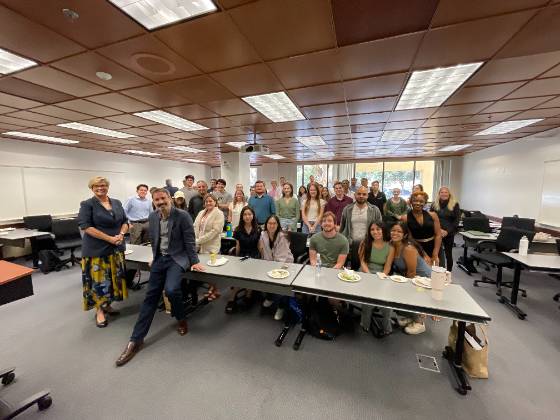Dr. Micah Weinberg speaks at the first Davenport Discussion of the semester

By Richard Barnes and LaMontria Edwards
On September 4, 2024, the Davenport Institute welcomed Dr. Micah Weinberg, former President of the Bay Area Council Economic Institute and former CEO of California Forward , to the Malibu campus for the first Davenport Discussion of the year. Dr. Weinberg holds a Ph.D. in political science from UNC-Chapel Hill and graduated with honors from Princeton, he serves on multiple advisory boards and was named in San Francisco Business Times’ “40 Under 40.”
Dr. Weinberg began the discussion by talking a little about himself and the research that he has conducted over the course of his professional career. Weinberg’s research emphasizes affordable healthcare, economic opportunity, housing security, and transportation. Weinberg’s past experience as a Senior Research Fellow, Policy Advisor and CEO, has led to where he is now and enabled him to work on delivering an innovative tool for technology-enabled deliberative democratic engagement.
Dr. Weinberg spoke with the students of Pepperdines’ School of Public Policy (SPP) about the voting process and the challenges that voters are confronted with. Weinberg highlighted one growing challenge in the voting process is that “the ballot is so complicated, people default.” This insight underscores the difficulties voters face—not only in California but across the nation—as ballot complexity can discourage full participation, leaving many citizens unsure of how to vote or the importance of their engagement. Dr. Weinberg’s remarks serve as a reminder of the importance of simplifying the voting process and expanding civic education. As policy leaders, it is crucial to ensure the democratic process remains accessible and understandable for all.
Dr. Weinberg’s reflections remind policy leaders of their responsibility not only to advocate but to become experts, ensuring that raising awareness leads to sustainable, long-term solutions. His insights into governmental structures and power dynamics offer future leaders the framework to navigate the complexities of public service.
The Davenport Institute and SPP thank Dr. Weinberg for speaking with future leaders about the election process and the ways in which policy makers can encourage civic engagement.